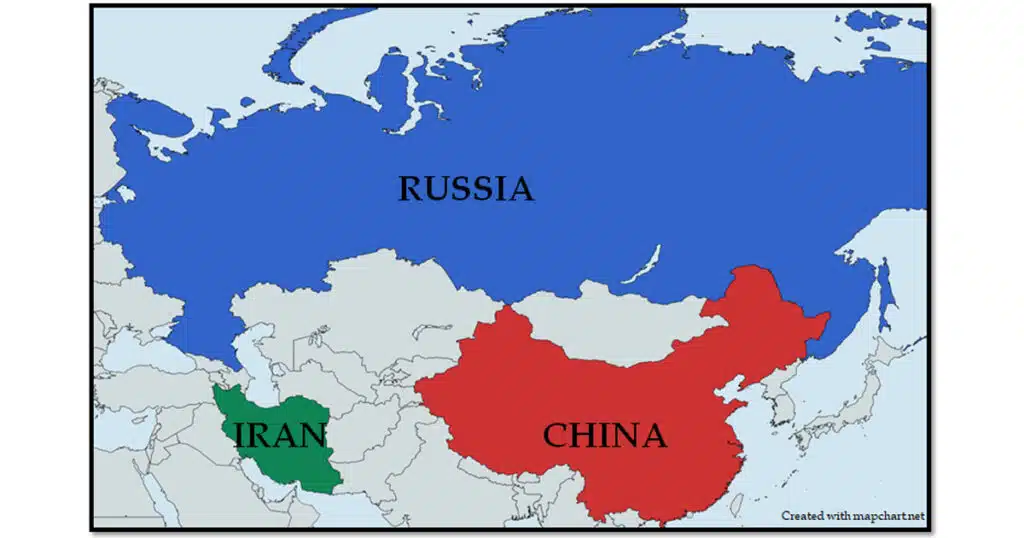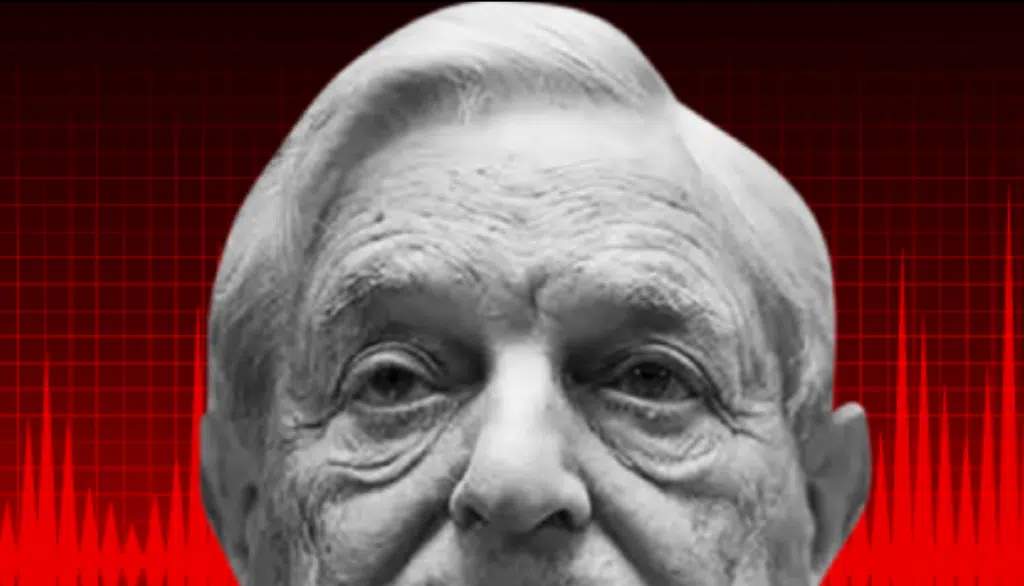
U.S. Should Undercut the Iran-Russia-China Three-Legged Stool
Iran and its proxies in Iraq may soon attack Israel in retaliation for it hitting a series of military targets inside of Iranian territory. Although we are still waiting to see if and how Iran responds, Israel’s most recent operation is simply a continuation of the multi-front war Iran, and its proxies have been waging against Israel since Hamas’s brutal attack one year ago.
While this is commonly referred to as the “Gaza war,” Israel’s military actions are a reminder that this conflict extends well beyond Gaza, with Iranian backed forces striking Israel from Lebanon, Syria, Iraq, Yemen, and the West Bank. Additionally, this war isn’t just regional—it’s part of a broader, global struggle where the Iran-Russia-China axis confronts Western nations. As we wait to see how Iran responds to Israel’s recent retaliatory strikes, the United States should recognize that weakening Iran doesn’t just improve the security of Israel, it bolsters the security of the U.S. and other Western nations.
The regional and global scope of the war became evident during a visit to Israel with the Jewish Institute for National Security of America’s (JINSA) delegation of former senior U.S. military officials. During briefings with Israeli leaders, it was made clear that Iran’s “ring of fire” has been attacking Israel not only from Gaza, but also from multiple fronts across the region, including Lebanese Hezbollah, a group with an arsenal of over 150,000 rockets and missiles. Israeli officials warned that the war would inevitably expand beyond Gaza—and it has, with Hezbollah already firing over 14,600 rockets, missiles and drones at Israel. This includes a recent assassination attempt against Israeli Prime Minister Benjamin Netanyahu.
Behind all of these operations is the nation of Iran itself, which launched an unprecedented direct attack on Israel in April, firing over 350 missiles and drones and following up this attack with an approximately 200 ballistic missile volley on October 1st. This escalation underscores the vital need for close U.S.-Israel cooperation in defending against Iran’s aggression. U.S. support, including deploying additional air defense, naval and air forces to the region, has sent a strong signal to Iran to avoid further escalation, but it doesn’t go far enough.
It has become obvious that Israel’s security cannot rely solely on defensive measures. To ensure its long-term safety, Israel and the United States must degrade Iran’s regional terror network. Israeli air operations in Syria, Yemen, Lebanon and Iran as well as their limited ground operations targeting Hezbollah are weakening Iran’s ability to project power. These actions deserve continued U.S. support, yet the U.S. has delayed the sale of certain key weapons, like MK-84 2,000 pound bombs, and the temporary transfer of MK-82 500 pound weapons out of concern that they could escalate the conflict. Additionally, senior US military officials have stated that the United States would likely be unable to provide Israel with the same level of military support in a conflict with Hezbollah as it had in past situations. These actions and statements not only undermine Israel’s ability to push back effectively against Iran, the lack of decisive and clear support for their efforts emboldens Iran and its proxies to also attack U.S. interests and personnel.
Since the start of the conflict one year ago, Iranian proxies have launched at least 184 attacks on U.S. troops in Iraq and Syria, including a deadly drone strike that killed three U.S. service members. Additionally, Iran-backed Houthis have attacked commercial ships and U.S. Navy vessels in the Red Sea, causing a significant drop in traffic through this vital waterway. Iran has also extended its aggression beyond the Middle East, plotting to assassinate former U.S. officials and conducting cyberattacks aimed at disrupting U.S. elections.
Iran’s growing alliances with Russia and China further intensify the global threat it poses. Russia has actively deployed Iranian-made drones to strike both civilian and military targets in Ukraine, showcasing a deepening military cooperation. More recently, Iran escalated its support by supplying Russia with ballistic missiles, bolstering Russia’s war efforts in Ukraine. This military collaboration is not limited to arms transfers; it reflects a shared opposition to Western influence and a growing alignment in strategic objectives between the two nations. Russia has also supported Iran’s aggression in the Middle East by providing Russian satellite data that transmitted targeting information to the Houthis so the terrorist group could more effectively attack Western ships in the Red Sea.
Meanwhile, Iran continues to fuel its regional and global ambitions by selling oil, predominantly to China, which has become a crucial economic lifeline for Tehran amid international sanctions. China’s purchasing of Iranian oil not only circumvents sanctions but also empowers Iran to continue financing its proxy networks and military projects. This evolving Iran-Russia-China axis represents a significant geopolitical challenge that extends beyond the Middle East, threatening Western interests globally.
The convergence of these three nations, each with its own confrontations with the West, poses a multifaceted global challenge that the United States has yet to fully address. As this alliance solidifies, it not only amplifies Iran’s ability to destabilize the Middle East but also strengthens Russia’s position in Ukraine and bolsters China’s influence in global energy markets. This partnership demands a national level strategy that incorporates all aspects of national power. That strategy can drive a more coordinated and assertive response from the U.S. and its allies to effectively counter the shared threats posed by these authoritarian regimes.
A comprehensive U.S. strategy to counter the growing Iran-Russia-China axis must begin with steadfast support for Israel, which serves as the key front in the fight against Iran’s expanding influence and desire to acquire a nuclear weapons capability. By fully backing Israel’s operations, the U.S. is simultaneously undermining Iran’s regional objectives and its capacity to assist its global allies.
Finally, fully supporting Israel sends a strong signal to both allies and adversaries that the U.S. is committed to defending its interest in the Middle East and around the world. The United States must recognize that Israel’s willingness and ability to counter, and dismantle, Iran’s terror network across the Middle East—and even strike at Iran directly—is an asset.
By putting boots on the ground and bombs on target in the fight against Iran, Israel might be fighting by itself, but it is not fighting for itself alone.
Lt. Gen. Charlie Moore, (USAF, ret.) was the former Deputy Commander, U.S. Cyber Command and a participant on the Jewish Institute for National Security of America’s (JINSA) 2024 Generals and Admirals Program. Ari Cicurel is the assistant director of foreign policy at JINSA.
This article was originally published by RealClearDefense and made available via RealClearWire.



